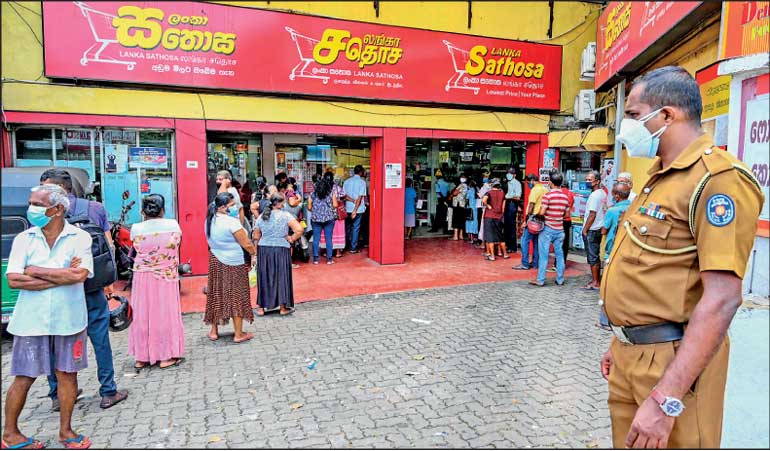Wednesday Feb 25, 2026
Wednesday Feb 25, 2026
Saturday, 4 September 2021 00:09 - - {{hitsCtrl.values.hits}}

A security personnel stands guard as people queue outside a State-run supermarket to buy essential food items in Colombo yesterday as Sri Lanka began imposing price controls on essential food as of yesterday after using a state of emergency to seize allegedly hoarded stocks of sugar and rice – AFP
By Charumini de Silva
The Government yesterday defended the enforcement of the emergency regulations to deal with the food crisis though the move has come under heavy criticism from the Opposition.
“The implementation of the emergency regulations has positively resulted in traders now selling sugar and rice at the Government-stipulated prices,” Consumer Protection State Minister Lasantha Alagiyawanna said at a media briefing held yesterday.
The prices of rice and sugar have increased uncontrollably amid the COVID-19 pandemic, despite various measures within the existing legal framework by the Trade Ministry, State Ministry and the Consumer Affairs Authority (CAA).
In this background, President Gotabaya Rajapaksa on Monday, 31 August, ordered emergency regulations to counter the hoarding of sugar, rice and other essential foods. Rajapaksa also appointed Major General Senarath Niwunhella as the Commissioner General of Essential Services.
Essential food items rice and sugar came under the Maximum Retail Price (MRP) regime with effect from 2 September.
“The price controls are essential at this time, but we hope they will not be long term,” he said, affirming that there was no food shortage in the country.
Acknowledging that the controlled prices might impact importers and traders, he said the strict measures were necessary to offer relief to the public and eliminate any malpractices by the private sector. “The importers and traders are now coming up with all possible excuses. I think only 5% of them are impacted, but this isn’t a time to argue on profits and losses,” he pointed out.
Alagiyawanna said the stocks of sugar and rice obtained by the CAA and the Essential Services after raids would be purchased by the Government and distributed among the general public at an affordable price.
According to the State Minister, 700 raids were led in search of stockpiled sugar, whilst 3,000 were conducted for rice countrywide.
He also said that preliminary work to import sugar and other essential food items approved by the Cabinet was in progress. Contrary to CAA claiming the country would have sugar stocks sufficient for the next 17 months, the State Minister said 135,000 tons of sugar stock would be adequate for just three months.
“A discourse between the Finance Ministry, Trade Ministry and the Central Bank is on, to resolve issues related to all imported goods necessary for the country, while also keeping a close tab on our foreign reserves,” he stressed.
He said the Government would also present 72 new amendments made to the Consumer Affairs Act No. 09 of 2003 to the Parliament on Tuesday (7), aimed at strengthening consumer protection and increasing penalties on errant traders.
“We hope that the amendments made to the Act can be enacted by next month, particularly the fines for violating the regulations,” he added.
The State Minister also cleared the air on the emergency regulations under the Public Security Ordinance which President Gotabaya Rajapaksa enforced early this week.
“The Public Security Ordinance was enacted in 1948 and further strengthened in 1978 and 1988. Accordingly, the President has been vested with powers to appoint any person as the Commissioner General of Essential Services. It doesn’t necessarily require a person from the Administrative Service,” he explained.
The State Minister also criticised Opposition Members of Parliament for making false remarks on the essential food situation in the country to international media outlets with an ulterior motive to get political gain.
Alagiyawanna called on the Opposition MPs to visit him at the State Ministry Office tomorrow from 10 a.m. stating that the Government was open for suggestions from any concerned parties.
